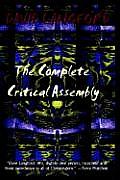The Complete Critical Assembly collects all of the White Dwarf, GM, and GMI book review columns by David Langford, which cover the SF book field from 1983 to 1991. Despite appearing in games magazines, Langford's column was a traditional book review column with only a few name-checks and analogies to role playing. Most columns are about three pages (a few longer); most books get only a paragraph. Given that this collection is comfortably over 300 pages, that means it covers a lot of territory.
For those not already familiar with David Langford, many-time winner of the Hugo award for best fan writer, his style is heavy on humor and not above a bit of light-hearted ridicule. He's often good for a laugh, but he can also sound flippant or silly, particularly in large doses. This is particularly noticeable in a collection of monthly columns heavy on formulaic style, such as the exaggerated drudgery of the open of most of the columns and the insertion of (probably fictional) editorial comments. The introductory paragraph from column #34 is typical:
With Christmas releases packing the stands in all their tinsel glitter, it's the reviewer's melancholy duty to play Scrooge and say rude things about the tarnish on each bauble. Gosh, how I wish I could be nice about everything; as a kind-hearted person I hate these cruel phrases.... [Bah! Humbug! – Ed.] Still, some moments make it all worthwhile, as when a burdened postman looked at me and at a Penguin parcel addressed to 'David Langford, The White Dwarf.' Your reviewer is a shade under six-foot-three. After cogitation the postman said, 'Is it a kind of pea?' The repartee which rose to my lips was unsuitable for family magazines.
Sometimes the humor hits; sometimes it misses. Best read intermixed with other things in smaller doses, I think.
Apart from style, this is a rather substantial collection of book reviews, ones written for regular publication and hence dealing with whatever was sent for reviewing. Langford's approach differs from most of the book review columns I read, such as those in Locus or Asimov's Science Fiction, which deal with only two or three books a month and usually only the ones the reviewer likes. Langford instead covers more books at shorter length, giving something of a survey of each month's material and spending some time on books that didn't measure up.
While it does cover briefly the well-known good books of this time period, this collection dives much farther into the midlist and differentiates between the entertaining but not Important and the truly bad. This is a very nice change. It's not as satisfying if you're looking for an in-depth exploration of the themes and quality of a particular book, but Langford mentions books and points at authors who are rarely mentioned in other review formats.
Langford also writes negative reviews more commonly than most reviewers. I know the desirability of negative reviews is much-debated, but I like them occasionally. For one, there's a definite difference between an average midlist writer, who may well be worth reading if one is in the mood for what they do, and a poor writer. Without negative reviews it's almost impossible to draw that distinction. For another, I find it easier to get a feel for what a reviewer likes and doesn't like, and hence how to weight and adjust their reviews for my preferences, with a mixture of positive and negative.
One of the best parts about reading a review collection like this from fifteen to twenty-five years later is the reminder of the chronology. I find it easy to forget how late some now-deceased writers were still writing (Langford here reviews the last two Foundation sequels as they came out) and which writers were contemporary. It's useful to be reminded of the timing of first publication since a lot of SF reacts to other contemporary SF. Having a feel for the timeline of writing helps in following the conversation.
If you've already read some Langford, you probably have a good idea of whether you'd like this or not. Unlike some of his other review collections, the columns here aren't available from David Langford's web site, but if you're not already familiar with his writing, there are many other samples there. Recommended if you like reading book reviews, particularly ones that survey a broad spectrum of the field.
Reviewed: 2008-08-24
